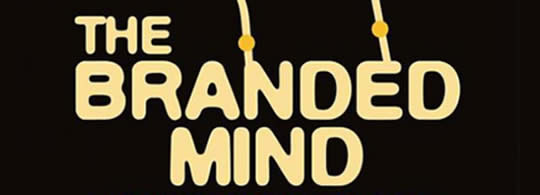The Branded Mind by Erik du Plessis

Book Review – The Branded Mind: What Neuroscience Really Tells Us about the Puzzle of the Brain and the Brand by Erik du Plessis.
If you are tired of pop psychology and fluffy neuro-books, then The Branded Mind by Erik du Plessis is for you. This is a book with voluminous research and serious thinking about how brands embed themselves in our brains.
The first part of the book explains how our brains function at various levels, starting with individual neurons and working up to larger structures. Readers who aren’t brain buffs might find this section a bit opaque, but du Plessis keeps things interesting with real-world stories from his years of experience in practical market research. In a section on memory and how our brains classify things, for example, he recounts the tale of a bank’s ad campaign that featured a high-jumper clearing a bar. The campaign failed to improve brand recall for the bank. Digging into the problem, the market researchers found that the bank ads were similar to Gatorade commercials featuring a high-jumper. Further study showed that when the bank commercials aired, brand recall for Gatorade improved!
Pay Attention to Attention
The section titled Some Marketing Implications is perhaps the most interesting part of the book. Du Plessis spends quite a bit of time on the topic of attention. Even though he considers this area to be the lowest level of discussion for marketers, he notes that, “without attention and memory nothing happens.” In this section, he covers issues like the memorability of fast-forwarded commercials and the interesting area of “re-cognition.” The latter explores how our brain response differs when we see an ad for the second, third, and subsequent times.
Du Plessis then delves into the brand soma, which he describes as follows:
The brand soma is the “feelings” part of the interpretation that comes to mind, and gives my rational processes a large part of the input required to “think” about the brand as an alternative behavior.
Another part of the section discusses market segmentation by traditional and neuromarketing means. One of the key points du Plessis makes is that segmentation must be far more than demographic – customers have different emotional reactions to products, and these will greatly affect their brand preference. More importantly from a neuromarketing standpoint, these differences will also create different observed neurological responses to products and brands. A “chocoholic,” for example, will exhibit markedly different brain activity in reacting to a candy bar than a person who views it as a reward, or one who consumes chocolate for fast energy.
The shortest part of the book is an interesting one titled “Creating Mischief,” in which du Plessis skewers many of the common catch-phrases in neuromarketing, ranging from the elusive but desirable “buy button” in our brain to the oft-repeated assertion that 90 percent of our decision-making is subconscious (I’m guilty, though I use 95%!). Du Plessis dismisses the simplistic buy button, and offers a much more nuanced explanation of decision-making that involves multiple levels of awareness during a choice process.
The Branded Mind should be on every serious marketer’s bookshelf. The book has an academic feel, which casual readers may find a bit off-putting but which will appeal to those who want to really engage the topics and do further reading in selected areas.
Irrelevant Backstory
Now that my book Brainfluence is shipping from Amazon.com and Barnes & Noble.com, I like looking at the “Customers Who Bought This Item Also Bought” listings. For a couple of days, second on Amazon’s list (right after Martin Lindstrom’s Brandwashed, the current best-seller in the neuromarketing space), is The Branded Mind.
I found this juxtaposition flattering, as du Plessis’s book is a deep, thoughtful look at how our brains respond to brands. My book isn’t “dumbed down,” but it’s intended for a business reader who wants simple, actionable advice without a lot of theory. The Branded Mind is clearly written for readers who prefer a rigorous examination of relevant research combined with original conclusions drawn from that work. My paper copy of TBM is festooned with little Post-It tabs!
After seeing The Branded Mind pop up in that list, I went to check my review to be sure the book links were up to date. To my surprise, I found I had never published it. This rectifies that omission!
Amazon: The Branded Mind: What Neuroscience Really Tells Us about the Puzzle of the Brain and the Brand
Kindle: The Branded Mind: What Neuroscience Really Tells Us about the Puzzle of the Brain and the Brand

A very interesting post about the science of Neuromarketing and this interesting book. And, I like the point about the different reactions that one person may have to a product versus another person: a very legitimate one. However, Neuromarketing research has a weakness in that it is conducted within a laboratory setting. But the demands for one’s attention are much higher on the street than in a controlled environment. This has implications: Neuromarketing makes no connection to how one’s brain reacts versus whether one actually acts on a brain impulse. Just as a response to a focus group question is not the best indication of what someone will or will not do. I like the science of Neuromarketing, and I do agree with the importance of using more than just demographics to segment, however, Neuromarketing in itself can not explain conversion, only intention.